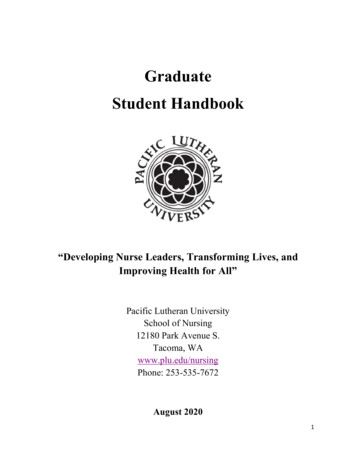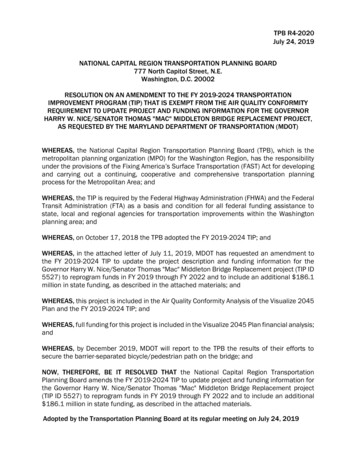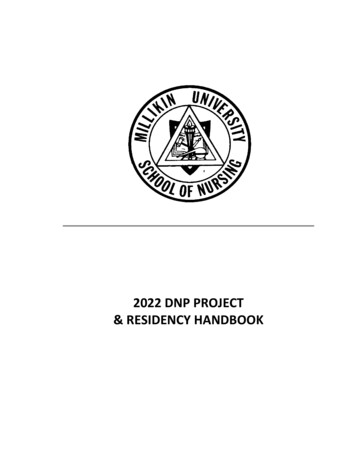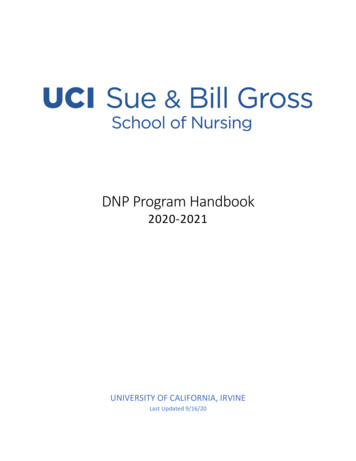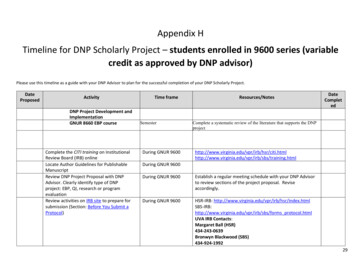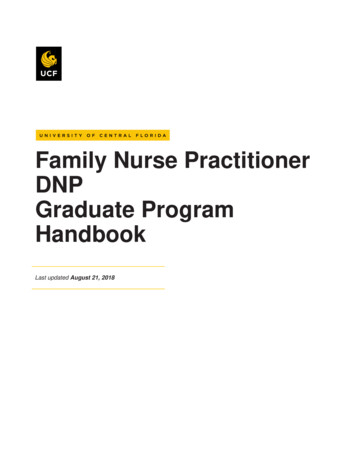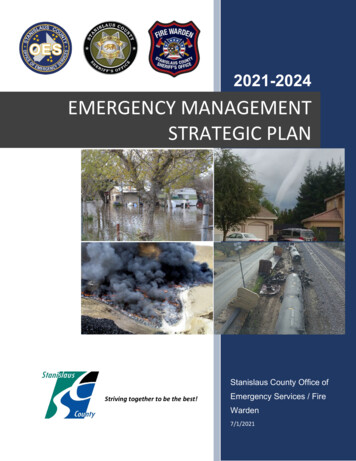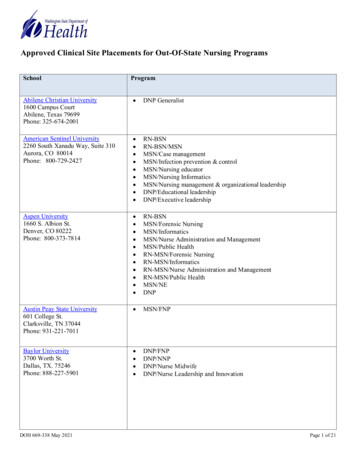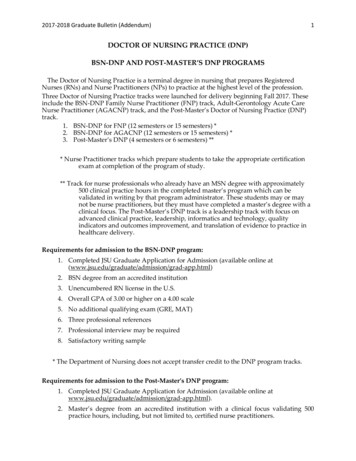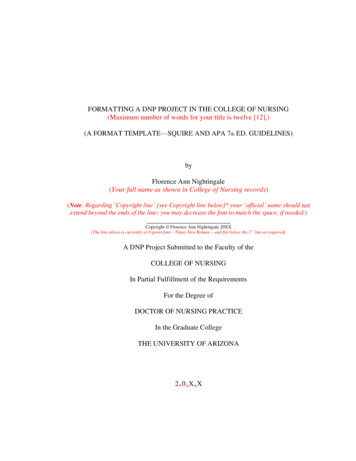
Transcription
DNP Student Handbook2023-2024The University of AkronCollege of Health and HumanSciencesSchool of Nursing
Table of ContentsIntroduction . 0Doctor of Nursing Practice Overview . 1DNP Post-MSN Plan of Study . Error! Bookmark not defined.Core Courses . 4DNP Project Committee Roles . 6DNP Project Timeline.11DNP Project Guidelines .12Rules, Policies, and Procedures .13Grievance Procedure for Graduate Students. . 15Plagiarism and Academic Integrity .16Library Resources: .16Clinical Agency Requirements.16Accreditation .16
IntroductionThis student handbook is designed for graduate students enrolled in The University ofAkron, College of Health Professions School of Nursing, Doctor of Nursing PracticeProgram (DNP). The DNP program provides practiced-based doctoral education foradvanced practice nurses.Doctor of Nursing Practice OverviewThe Doctor of Nursing Practice (DNP) program at The University of Akron offersdoctoral preparation to nurses whose career emphasis is on furthering their directclinical advanced nursing practice skills (Clinical Nurse Specialist, Nurse Practitioner,Nurse Anesthetist, and Nurse Midwife) or whose practice is in areas that directlysupport clinical practice such as nursing administration and/or healthcarepolicy/program development. The DNP program at The University of Akron is a postmasters model and candidates therefore must be credentialed to be considered foracceptance.The program is offered in a hybrid format. This means that there is a blend of intensiveface-to-face, distance and/or asynchronous learning modalities that are determinedbased on the course/content/semester. The student can complete the program in twoyears of full time (two courses per semester) study. Part time options are alsoavailable.The University of Akron has a long tradition of being home to one of Ohio’s top rankedprograms of nursing. One of the particular strengths of our DNP program is that unlikeother DNP programs, the courses at The University of Akron are taught by acomplimentary blend of DNP and PhD prepared faculty, thus offering the studentexposure to the best of both clinical/professional and academic/research scholarship.SCHOOL OF NURSING MISSION STATEMENTThe school offers diverse and comprehensive nursing education programs at theundergraduate and graduate levels. The programs of study, based on professionalstandards, prepare individuals to provide nursing care in a variety of settings. TheSchool of Nursing supports nursing research that contributes to the health and wellbeing of society. The School is committed to serving culturally, racially, and ethnicallydiverse populations. Through academic and community collaboration, the schoolpromotes excellence in nursing education, research, practice, and service.GOALS1. Prepare generalist and advanced practice nurses who are eligible for initial licensureand for certification.1
2. Provide a foundation for lifelong commitment to professional development andscholarship through continuing education and advanced study at the master’s anddoctoral levels.3. Prepare nurses who are sensitive in caring for diverse populations in a variety ofsettings.4. Prepare professional practitioners who integrate leadership roles and ethicalstandards in a continuously changing health care arena and society.DNP MISSION STATEMENTTo prepare doctoral level nursing leaders who will advance and transform nursingthrough evidence-based practice, leading to improved patient outcomes.DNP PROGRAM OUTCOMES Use appropriate theories and concepts to identify health-relatedphenomena of interestDesign and deliver interventions that can withstand scientific analysisEvaluate health care delivery and nursing practices using soundevaluation principlesUse evaluation and other methods to account for quality of care andpatient safety for focus populationsCritically appraise and/or use sources informing best evidence, i.e.epidemiology, statistics, health data, and/or methodologiesDeliver and evaluate care processes and outcomes based on bestevidenceAnalyze and define critical choices among health care technologies andinformation systems toward the betterment of care processes andoutcomesUnderstand the dynamics of health care policy and financing at theorganizational and national levelsProvide or assist in the leadership of collaborative, inter-professionalteams in health care delivery2
Post-MSN to DNP Plan of StudySummer One8200:714 Synthesis and Applicationof Evidence for Adv. Practice Nurses(3 credits)3 creditsSummer Two8200:712 Fiscal Management inHealthcare (3 credits)8200:715 Fundamentals of PublicHealth Epidemiology (3 credits)Fall One8200: 705 Clinical Nurse Scholar I (3credits)Spring One8200: 700 Information Managementin Health Care (3 credits)6 credits8200: 706 Clinical Nurse Scholar II (4credits)7 creditsFall TwoSpring Two8200: 713 Advanced Leadership inHealthcare (3 credits)8200: 708 DNP Project I (3 credits8200: 710 Advanced HealthcareStatistics (3 credits)8200:848 Program Evaluation inNursing (3 credits)8200: 709 DNP Project II (3 credits)8200:707 Clinical Scholar Residency(3 credits)6 credits6 credits9 creditsNote: 37 Total program hours are required to graduate. Students must be enrolled each semesteruntil the DNP Project is complete.3
Core CoursesDoctor of Nursing Practice Program8200:715 Fundamentals of Public Health Epidemiology. This course introducesprinciples, methods, and application of epidemiology. The course covers the history ofepidemiology, concepts of disease causation and prevention, measures of diseasefrequency and excessive risk, epidemiologic study designs, causal inference, outbreakinvestigation and screening. Provides experience with calculation of ratestandardization, measures of disease frequency, association and impact, and sensitivityand specificity of screening tests. The course highlights the applications ofepidemiology to the understanding of disease etiology, transmission, pathogenesis, andprevention, evaluation and public policy development.8200:710 Advanced Healthcare Statistics. This course focuses on an in depthexamination of descriptive statistics, correlation, regression, multiple regression sets,scaling, nonlinear transformation, missing data, and interactive effects; includingmanipulation of data, integrating understanding of inference and probability.8200:713 Advanced Leadership in Healthcare. This course focuses on advancedcompetencies of doctoral-prepared advanced practice nurses for transformationalinterprofessional leadership in healthcare to improve patient and population healthoutcomes. The five key leadership competencies including creating and leading change;self-knowledge; strategic vision; interpersonal communication; and organizationaleffectiveness are presented with examples and case studies.8200:848 Program Evaluation in Nursing. This course analyzes theories and modelsof program evaluation and their relationships to designs, processes, techniques, andoutcomes in nursing- related evaluations.8200:714 Synthesis and Application of Evidence for Advanced Practice Nursing.This course focuses on concepts, models and methods for implementation of evidencebased nursing practice at both individual clinician and system levels. Competencies forthe identification, analysis, synthesis and application of evidence relevant to nursingand health care practice are developed. Factors that facilitate and impede implementingand sustaining evidence-based practice are considered. Students learn skills foridentification of clinical problems in advanced practice nursing and promoting adoptionand implementation of evidence-based solutions to promote patient health outcomes.8200:700 Information Management in Healthcare. This course focuses on nursinginformatics to support clinical decision making in advanced nursing practice.8200:712 Fiscal Management in Healthcare. This course examines the role and therequired skills for the Doctor of Nursing Practice (DNP) graduate as a nurse leader inthe understanding of the business acumen and the financials of health care.Revised 8/20/15, 4/16/18, 11/28/18, 6/7/21Reviewed 8/12/16; 8/24/17, 5/15/2020, 6/9/20224
8200:705 Clinical Nurse Scholar I. This is the first of two seminar coursesaccompanied by clinical practice with expert preceptors. Focus is on transitioning to theclinical scholar leader role within an identified area of advanced nursing practice.Emphasis is placed on the epistemology underlying advanced nursing practice and theintegration of theoretical frameworks and evidence-based practice principles inachieving optimal health outcomes for individuals and groups. This course is comprisedof 2 didactic content hours per week and a clinical practicum of 7 hours per week.8200:706 Clinical Nurse Scholar II. This is the second of two seminar courses thatfocuses on translating and integrating theory and scientific evidence into the clinicalwork of the advanced practice nurse. Culturally-aware approaches are developed toresolve a healthcare issue using theoretic models and principles of evidence-basedpractice to design innovative interventions. This course is comprised of 2 didacticcontent hours per week and a clinical practicum of 14 hours per week.8200:708 and 709 DNP Project I and II. Faculty and preceptor directed project thatcontributes to nursing practice knowledge. The course culminates in an oralpresentation and a publishable manuscript. DNP Project students must register for atotal of 6 hours,2 to 6 hours in a single semester, distributed over three semesters ifdesired.Satisfactory/Unsatisfactory (S/U) grading; In Progress (IP) grade permissible.Continuous registration is required until all degree requirements are met.8200:707 Clinical Scholar Residency. This course is the synthesis of components ofclinical scholar leader role that comprises this practicum. Students apply advancedleadership and clinical scholarship skills to developing and evaluating approaches tohealthcare problems in a practicum setting.Revised 8/20/15, 4/16/18, 11/28/18, 6/7/21Reviewed 8/12/16; 8/24/17, 5/15/2020, 6/9/20225
DNP Project Committee RolesThe student, advisor, faculty co-advisor, and preceptor serve in various roles duringthe student DNP experience, which facilitates progression and attainment of the Doctorof Nursing Practice degree. For example:DNP Academic/Project Advisor: At the start of the DNP program, each student will beassigned an advisor. The DNP Academic/Project Advisor may be a DNP/PhD preparedfaculty member or administrator of the School of Nursing who holds graduate facultystatus. All DNP advisors will be familiar with the DNP program and will haveclinical/scholarly expertise. The DNP Academic/Project Advisor will provide academicadvisement throughout the program. It is the right of a student to change advisors.Should a student wish to change an advisor, the student should contact the DNPCoordinator.DNP Project Faculty Advisor: The DNP Faculty Advisor works closely with the studentto support and assist with the development and revisions of the DNP Project.Faculty Co-Advisor: The DNP Project faculty co-advisor is another DNP/PhDprepared facultymember who holds graduate faculty status. The faculty co-advisorprovides clinical/scholarly expertise and provides comments/revisions for the DNPProject. The co-advisor works in collaboration with the advisor to provide feedback tothe student.Preceptor: The preceptor should hold a doctoral degree such as a DNP, PhD, MD,PharmD, etc. The preceptor can be from a variety healthcare disciplines. The preceptorwill serve in a consulting role and may be helpful in navigating the clinical setting. Forexample, a preceptor may facilitate advanced practice experiences and provide entry tovarious interprofessional team experiences in which they may or may not participateon themselves. Clinical preceptors may have varied skill sets, educational credentials,and expertise. Students cannot be precepted by a spouse or family member.Course designated clinical experiences are facilitated by the preceptor and may includebut not be limited to: Providing curricular, professional, or programmatic guidanceServing as a resource person and/or role modelEnhancing the learning experiences of the DNP studentProviding access to a setting or population of patientsProviding leadership opportunities within the systemFacilitating interprofessional team leadership experiencesClinical hours are logged by the student. Clinical hours may include hours on the DNPProject proposal including development, clinical contact hours, and hours based onparticipation in leadership activities and committees. The faculty or DNP Coordinatormay be contacted to clarify what constitutes clinical hours.Revised 8/20/15, 4/16/18, 11/28/18, 6/7/21Reviewed 8/12/16; 8/24/17, 5/15/2020, 6/9/20226
The following table outlines responsibilities of the student, advisor, co-advisor, andpreceptor in selected courses of the DNP curriculum.CourseSynthesisandApplicationof olar IStudentResponsibilitiesContact AdvisorShare drafts ofPICOT questionwith advisorIdentify a list ofpotentialpreceptorsDevelop goalsand objectivesfor working withpreceptorChoose preceptorandcommunicategoals andobjectivesObtain preceptorvita/resume,contactinformation, andvalidatelicensure.Providedocumentation tofacultyDeveloppreliminarybackground andAdvisor &Co-AdvisorResponsibilitiesProvide feedbackon PICOTquestionPreceptorResponsibilitiesCourse FacultyResponsibilitiesNoneGuide andcritique thePICOT questionFacilitate thestudentprogression plan,consideringprogrammaticand professionaldevelopmentneedsMaintain studentcontact duringproposaldevelopmentServe as aresource to thestudent as theydevelop goals andobjectives toshare with thepreceptorReview student’sdevelopingproposal andprovide guidancerelated tocontent, thefeasibility of thestudy andpossiblecollaborationsand resourcesRevised 8/20/15, 4/16/18, 11/28/18, 6/7/21Reviewed 8/12/16; 8/24/17, 5/15/2020, 6/9/20227Encouragestudent contactwith the advisorFacilitatelearningactivities toachieve courseobjectivesProvide agencyorientation forthe student, e.g.,agency policiesand proceduresand otherrequirementsMeet regularlywith student toreview goals andobjectives andprovide feedbackEnhance thelearningexperiences ofthe studentFacilitate thestudenttransition to thenext courseCollect preceptorvitas, contactinformation, andvalidation oflicensure; file instudent recordReview andapprove goalsand objectivesfor working withpreceptorIdentify if anaffiliationagreement isneeded andprovidemechanism toobtainProvide entry toleadershipopportunities and Contactpreceptor asfacilitateinterprofessional necessaryopportunities at
significancethe systems levelReview theliterature relatedto a healthcareissue or situationMay reviewstudent’sdevelopingproposal andprovide guidancerelated tocontent, thefeasibility of thestudy andpossiblecollaborationsand resourcesCollaborate withadvisor duringproposaldevelopmentMaintain detailedclinical activitieslog according tocourserequirementsFile log of clinicalhours in studentrecordsSend thank youletter topreceptorsSubmit log tocourse faculty atend of courseClinicalNurseScholar II*Minimum of 90clinical hoursChoose a secondcommitteemember (coadvisor) from theSON in additionto preceptor orexternal expertDevelop/refinemethods sectionof proposalObtain IRBapprovalFacilitateformation of aDNP ProjectCommitteeRead and providefeedback to thestudent regardingthe proposaland/or assignedproject for thecourseSend proposal toDNP projectcommittee twoweeks prior toproposalpresentationPowerPointpresentation todefend proposalRevised 8/20/15, 4/16/18, 11/28/18, 6/7/21Reviewed 8/12/16; 8/24/17, 5/15/2020, 6/9/2022Enhance thelearningexperiences ofthe advancedpractice nursingstudentIf a member ofthe DNP ProjectCommittee,participate inproposalpresentationCollect preceptorvitas, contactinformation, andvalidation oflicensure; file instudent recordReview andapprove goalsand objectivesfor working withpreceptorIdentify if anaffiliationagreement isneeded andprovidemechanism toobtainContactpreceptor as8
necessaryto DNP ProjectCommitteeFile log of clinicalhours in studentrecordsSubmit log tocourse faculty atend of courseDNPProject Iand II*Minimum of 180clinical hoursSubmit log tocourse faculty atend of course ofhours completedtoward the 270residency hoursComplete DNPProjectFacilitate projectimplementationand finalmanuscriptdevelopmentFacilitate projectimplementationServe as aresource personand/or rolemodelProvide access toa setting orpopulation ofpatientsSchedule DNPProjectPresentationProvide copy ofDNP Projectpaper tocommitteemembers 2weeks prior toDNP ProjectPresentationIf member of theDNP ProjectCommittee,participate inDNP ProjectPresentationSend thank youletter topreceptorsCollect preceptorvitas, contactinformation, andvalidation oflicensure; file instudent recordReview andapprove goalsand objectivesfor working withpreceptorIdentify if anaffiliationagreement isneeded andprovidemechanism toobtainContactpreceptor asnecessaryDevelopPowerPoint topresent DNPProjectFile log of clinicalhours in studentrecordsSend thank youletter topreceptorsRevised 8/20/15, 4/16/18, 11/28/18, 6/7/21Reviewed 8/12/16; 8/24/17, 5/15/2020, 6/9/20229
ClinicalScholarResidencyRefine andimplement DNPProjectSubmit finalpublishablemanuscript toprojectcommitteeSubmit hours logto course facultyContinuefacilitation ofDNP Project andfinal manuscriptdevelopmentWork closelywith student andprovide ongoingfeedback*Minimum of 270clinical hoursduring DNPProject 1 & 2 andthe ClinicalResidencyProvide guidanceServe as aresource personand/or rolemodelCollect preceptorvitas, contactinformation, andvalidation oflicensure; file instudent recordReview andapprove goalsand objectivesfor working withpreceptorIdentify if anaffiliationagreement isneeded andprovidemechanism toobtainContactpreceptor asnecessaryValidate thatstudents haveacquired aminimum of1000 postbaccalaureatehoursFile log of clinicalhours in studentrecordsSend thank youletter topreceptors*All students must be able to validate 1040 post-baccalaureate hours upon completionof the program.Revised 8/20/15, 4/16/18, 11/28/18, 6/7/21Reviewed 8/12/16; 8/24/17, 5/15/2020, 6/9/202210
DNP Project TimelineDuring the spring semester of the first year of study, the student will meet withher/hisProject Advisor and form the DNP Project Committee. Once the committee is formedthe student will download the DNP Project Committee Designation and ApprovalsForm, found on the DNP website, to be completed by the DNP Project Committee. Oncecompleted, the student will file the form in the office of the Graduate Student ServicesCounselor.After the DNP Project Committee is confirmed, the student will work closely with theDNP Project Advisor to develop and revise the DNP Project Proposal. Once the DNPProject Proposal is approved by the DNP Advisor, the student must send a clean copyof the DNP Project Proposal to the DNP Project Committee 3 weeks prior to the DNPProject Presentation date. The student will work with the DNP Project Committee todetermine a DNP Project Proposal Presentation date during the spring semester of thefirst year to be attended by the DNP Project Committee. The preceptor may attend themeeting via video conferencing. If the preceptor needs to cancel on the selected date ofthe DNP Project Proposal Presentation, the DNP Project Proposal Presentation willneed to be rescheduled. The DNP Project Proposal Presentation is a 20-minutePowerPoint slide presentation of the student’s DNP Project. Following the DNP ProjectProposal Presentation, the DNP Project Committee will ask questions to determine thestudent’s knowledge of the research process and readiness to move forward with theDNP Project. Often, revisions to the DNP Project Proposal are required before movingforward in the program. The DNP Project Committee will deliberate and return adecision to approve or disapprove the DNP Project. If approved, the DNP ProjectCommittee Designation and Approvals Form will be signed by the DNP ProjectCommittee. The student will file the form in the office of the Graduate Student ServicesCounselor.If a student receives a vote of disapproval, the student will work with the DNP ProjectAdvisor to address the concerns of the DNP Project Committee. Then the DNP ProjectCommittee will meet for a second DNP Project Proposal Presentation. A secondfailure will result in student dismissal from the DNP Program.Once the DNP Project Committee approves the DNP Project Proposal, the student willwork with the DNP Project advisor/preceptor to apply for Institutional Review Board(IRB) approval, which must be obtained prior to the student initiating the DNP Project.IRB information can be found at http://www.uakron.edu/research/ora/irb. Allstudents must complete CITI Training for the ethical conduct of research.If a student is conducting the DNP Project at a healthcare institution, it may benecessary to seek IRB approval at both the healthcare institution and The University ofAkron. The student has the responsibility to contact The University of Akron IRB todetermine if reciprocity of approval is available. Once IRB approval is obtained, it is theRevised 8/20/15, 4/16/18, 11/28/18, 6/7/21Reviewed 8/12/16; 8/24/17, 5/15/2020, 6/9/202211
student’s responsibility to ensure the IRB approval number is added to the DNP ProjectCommittee Designation and Approvals Form and is on file in the office of the GraduateStudent Services Counselor.DNP Project GuidelinesThe DNP Project documents the student’s educational experiences, provides a measurefor evaluating the achievement of the DNP Essentials and DNP program outcomes, andshowcases the student’s growth in knowledge and expertise as a future DNP scholar. TheDNP Project results in 5 chapters as indicated below, and a publishable manuscript. TheDNP Project should serve as a foundation for future scholarly practice as a DNP withinthe clinical setting.The completed DNP Project will be written in APA format, typically 20 to 30 doublespaced pages in length excluding references, tables, and figures. The elements of thecompleted DNP Project are as follow:Title PageAbstract – 250 wordsChapter One: Nature of the Project1. Introduction2. Purpose and PICOT Question3. Significance to Nursing and HealthcareChapter Two: Review of Literature1. Theoretical Framework2. Review of Current ResearchChapter Three: Methods3. PICOT Question and Project Design4. Sample and Setting5. Procedures6. Instruments7. Data AnalysisChapter Four: Findings1. ResultsChapter Five:1. Discussion2. Limitations3. Implications for Nursing Practice4. ConclusionsAt the completion of the DNP Project, the student will work closely with the DNPAdvisor to develop and revise the 5 chapters of the completed DNP Project. Onceapproved by the DNP Advisor, the student must send a clean copy of the completedDNP Project to the DNP Project Committee 3 weeks prior to the Final DNP ProjectPresentation date. The student will work with the DNP Project Committee toRevised 8/20/15, 4/16/18, 11/28/18, 6/7/21Reviewed 8/12/16; 8/24/17, 5/15/2020, 6/9/202212
determine a DNP Project Presentation date. Please check the Graduate School websiteto determine the date all paperwork needs to be submitted in order to graduate inMay. The preceptor may attend the Final DNP Project Presentation via videoconferencing. If the preceptor needs to cancel on the selected date of the DNP ProjectPresentation, the DNP Project Presentation will need to be rescheduled. The Final DNPProject Presentation will occur via a 20-minute PowerPoint slide presentationfollowed by questions and discussion. After the Final DNP Project Presentation, theDNP Project Committee will deliberate and return a decision to approve or disapprovethe Final DNP Project Presentation. If approved, the DNP Project CommitteeDesignation and Approvals Form will be signed and the student will file the form in theoffice of the Graduate Student Services Counselor.It is imperative to acknowledge the contributions of faculty who contributed toyour project and manuscript by including them as co-authors on a manuscriptyou submit for publication.Rules, Policies, and ProceduresThe DNP requires 540 post-master’s practice hours. DNP students enter the programwith 500 or more hours from their master’s program, or they need to complete extraclinical hours in the DNP program to meet these entry criteria. To be accepted, thehours must have been part of a supervised academic program (e.g., degree orcertificate). Students must request written verification of the number of hourscompleted within their master’s program. If a student has achieved 1040 postbaccalaureate hours in the master’s program, a minimum of 270 hours must still becompleted in the DNP residency. In addition, students must complete hours in ClinicalNurse Scholar 1 and Clinical Nurse Scholar 2. Plans will be individualized based onreported hours, and to meet The Essentials of Doctoral Education for Advanced NursingPractice (2006), available NPEssentials.pdfAchievement of the DNP Essentials may occur in the context of direct patient care butmay also occur in other settings. It is possible for some practice hours to be metthrough the DNP Project while others are achieved elsewhere (e.g., work on a policyissue, leadership roles in professional organizations, etc.).The primary reference for rules, policies and procedures concerning graduateeducation at The University of Akron is the Graduate Bulletin published by the GraduateSchool. You may access the Graduate School Bulletin pdf. It is expected that allgraduate students become familiar with the policies and rules contained in thisdocument.Revised 8/20/15, 4/16/18, 11/28/18, 6/7/21Reviewed 8/12/16; 8/24/17, 5/15/2020, 6/9/202213
Mandatory Onsite AttendanceMandatory attendance is required for the in person and online asynchronous weekendimmersion classes twice a semester. Failure to attend a weekend may result in thestudent being withdrawn from the course. When possible, one class will be offered onSaturday and the second class will be offered on Sunday.If a student misses more than one weekend once the program has begun, thestudent may be withdrawn from the DNP program.Computer RequirementsThe DNP program is taught using online synchronous or face to face meetings(depending on the class) two weekends a semester and asynchronously during thesemester via online discussions, posted assignments, and learning activities. Allstudents must have a personal computer with sufficient memory, speed and softwarecapabilities to participate in online activities. Helpful information on computerrequirements and Technology Services can be foundat http://www.uakron.edu/it/ .The student may also contact the UA Computer Help Desk @ 330.972.6888 duringhours of operation.Withdrawing From a CourseStudents who withdraw from a course must officially complete the process as describedby UA policy found in the Graduate Bulletin. Failure to withdraw from a course willresult in a grade of “F”.Entering the Program and Request for Program LeaveOnce a student is accepted into the DNP program, if the student chooses not to enter inthe semester and year accepted a new application is required for consideration in asubsequent year.DNP students are admitted annually for a summer start date. Courses are offeredsummer, fall, and spring. If a student steps out for personal, professional or academicreasons, the student must notify the DNP Coordinator in writing. When the student isready to re-enroll, a written request must be submitted to the DNP Coordinator to jointhe next cohort. If the student plans to use previously earned credits, those must fallwithin the ten-year time limit for obtaining a doctorate. The 10-year timeline alwaysbegins with the first course the student takes that applies to the program. Should astudent request a leave, the student will still need to enroll in at least one credit for eachfall and/or spring semester of their leave per the Graduate School’s continuousenrollment requirement.Continuous Enrollment RequirementThe Graduate School requires that a doctoral student register for a minimum of onegraduate credit as approved by her/his adviser during each fall
The University of Akron has a long tradition of being home to one of Ohio's top ranked programs of nursing. One of the particular strengths of our DNP program is that unlike other DNP programs, the courses at The University of Akron are taught by a complimentary blend of DNP and PhD prepared faculty, thus offering the student
